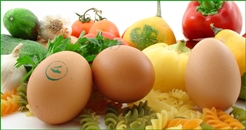 Food as freedom
Food as freedom
From a video by Thinq
Dr. Jason Streubel is a biologist and an adviser to Convoy of Hope which serves vulnerable communities around the world through strategic agriculture initiatives. He spoke to Thinq about the importance of food. Here is an abridged version:
I grew up in the woods of Western Washington about an hour and a half north of Seattle. And it is there on my grandfather's cherry orchard that I started to wrestle with understanding my journey with understanding people, the complexity of food and agriculture.
In my early days, my family was poor and hungry. And hunger and poverty will make you do things you would have never imagined. The orchard, the largest garden you had ever seen, the hours and hours of canning that we did all because my grandfather understood that food was freedom.
Because the ability to know where your next meal is coming from is empowering. And if you don't know how to answer that question, it becomes all encompassing as the hunger pains increase, and you will do whatever you can to get food on the table and your next meal for you and your family.
Food is complicated. Food is political. And the food is very spiritual.
We now have a large disconnect that is generational on where our food comes from. In the United States, 1.3% of the population produces the food that we eat on 2 million farms. In 1935, that was 7 million farms. In 1885, 75-70% of the population produced the food that was eaten.
The decrease is because of some amazing advancements in technology but those advancements in technology have complicated food.
There's the growers all across the world, the inputs, the outputs, the machine, the land use, the land tenure, and then there's the processors, the storage, more processing, more storage then there's the buyers, the sellers, the inspectors. And then there is the soil, which is the most amazingly designed thing that God ever created - it shows God's creation everywhere. Then there's the human skill, transportation, the role of government, imports, exports, tariffs, taxes, treaties.
If something in that system goes wrong, we will do everything possible and things that we never thought imagined to get it because food is freedom.
Now the elephant in the room when we talk about the complexities of agriculture is changing climate. But that's not just climate change that I'm talking about. I'm talking about the changing climate in leadership and the power that it has over food. We've all been around political conversations long enough to see that politics and food go together. I've been around conversations where food has been used as an amazing tool or as a weapon of mass destruction.
Food is complex, and because of its complexity, whoever is in the politics and who is in control, controls the people and controls freedom.
And as we as a church explore what that means for us. I implore us to be the hands and feet of Jesus and to jump into the mess of humanity and feed our communities because in the end, it is very spiritual.
John 10v10 says that the enemy comes to kill, steal and destroy, but I have come that you might have life. All around the world, the enemy wants to keep people from thriving and he uses hunger and poverty to do it.
I've seen it staring down witchdoctors in the fields of Haiti, and I've seen it for 17 years pastoring in the Pacific Northwest. When the enemy reverts to food, he knows that if people don't know where their next meal is coming from, they will do things they never imagined. I will sell myself into slavery. I will sell my child into slavery. I will join the Taliban. The devil has been using food since the days of Adam and Eve.
God knows that food is so powerful and that's why he said save the corners of field for the poor and the hungry twice. He had Joseph store food to save the genealogy of Christ. He used fish and loaves to feed 1000s to show his power. And it's how he spread the church because the disciples could go but the elders got to stay and they were able to feed the widow and the orphan.
But as the Church we have to understand that food is complex. It is political and it is spiritual. And we have to understand what that means for us now. Food security could become a thing that the church does, or it could be our biggest blind spot.
Listen to the 9 minute talk here.
Retweet about this article:
From a video by Thinq, 27/03/2024